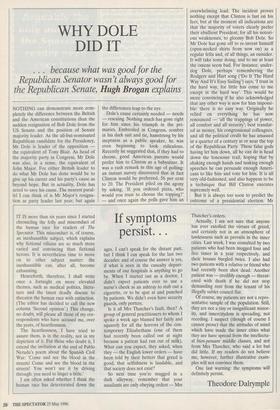If symptoms
persist. . .
IT IS more than six years since I started chronicling the folly and misconduct of the human race for readers of The Spectator. This misconduct is, of course, an inexhaustible subject, which explains why fictional villains are so much more varied and convincing than fictional heroes. It is nevertheless time to move on to other subject matter: the inexhaustible can, after all, become exhausting.
Henceforth, therefore, I shall write once a fortnight on more elevated themes, such as medical politics, litera- ture and the latest deadly disease to threaten the human race with extinction. (The editor has decided to call the new column 'Second opinion'.) This change, no doubt, will please all those of my cor- respondents who have accused me, over the years, of heartlessness.
The heartlessness, I have tried to assure them, is in the reality, not in my depiction of it. For those who doubt it, I extend the invitation at the end of Pablo Neruda's poem about the Spanish Civil War: 'Come and see the blood in the streets! Come and see the blood in the streets! You won't see it by driving through: you need to linger a little.'
I am often asked whether I think the human race has deteriorated down the ages. I can't speak for the distant past, but I think I can speak for the last two decades: and of course the answer is yes, if what is seen in the casualty depart- ments of our hospitals is anything to go by. When I started out as a doctor, I didn't expect patients ever to use a nurse's cheek as an ashtray to stub out a cigarette, or to be spat at and punched by patients. We didn't even have security guards, only porters. Is it all Mrs Thatcher's fault, then? A group of general practitioners to whom I spoke a week ago blamed her fairly and squarely for all the horrors of the con- temporary Elizabethans (one of them had recently been called out at night because a patient had run out of milk). What can you expect, they asked, when they — the English lower orders — have been told by their betters that greed is good, that selfishness is laudable, and that society does not exist?
So next time you're mugged in a dark alleyway, remember that your assailants are only obeying orders — Mrs Thatcher's orders.
Actually, I am not sure that anyone has ever extolled the virtues of greed, and certainly not in an atmosphere of lawlessness such as prevails in the inner cities. Last week, I was consulted by two patients who had been mugged four and five times in a year respectively, and their houses burgled twice. I also had two patients with a relative or friend who had recently been shot dead. Another patient was — credibly enough — threat- ened with death if he did not stop demanding rent from the tenant of his illegally sublet council flat.
Of course, my patients are not a repre- sentative sample of the population. Still, they are not a tiny or insignificant minor- ity, and innercitydom is spreading, not receding. I suspect (though of course I cannot prove) that the attitudes of mind which have made the inner cities what they are have spread from the intellectu- al bien-pensant middle classes, and not from Mrs Thatcher, who said a lot but did little. If my readers do not believe me, however, further illustrative exam- ples will not convince them.
One last warning: the symptoms will definitely persist.
Theodore Dalrymple


























































 Previous page
Previous page